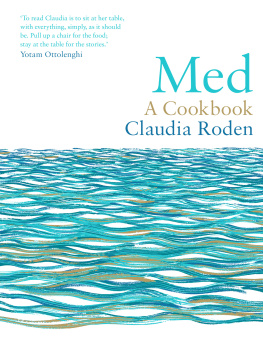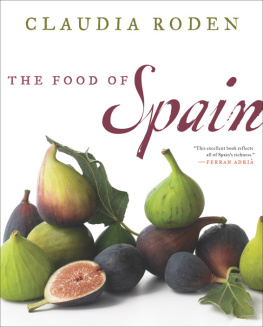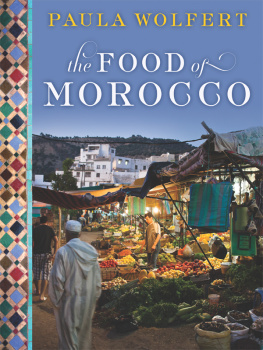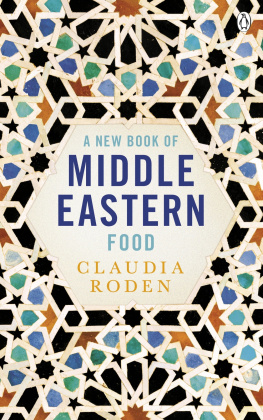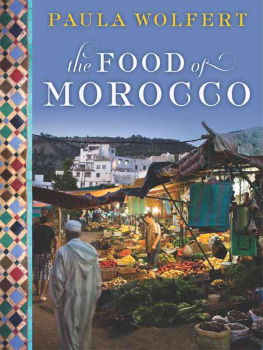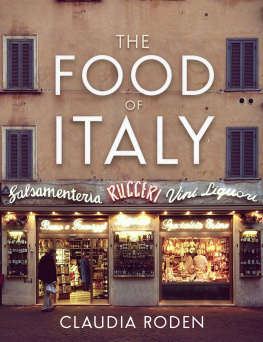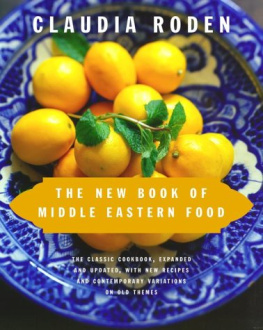Claudia Roden - Arabesque: A Taste of Morocco, Turkey, and Lebanon
Here you can read online Claudia Roden - Arabesque: A Taste of Morocco, Turkey, and Lebanon full text of the book (entire story) in english for free. Download pdf and epub, get meaning, cover and reviews about this ebook. year: 2005, publisher: Knopf, genre: Home and family. Description of the work, (preface) as well as reviews are available. Best literature library LitArk.com created for fans of good reading and offers a wide selection of genres:
Romance novel
Science fiction
Adventure
Detective
Science
History
Home and family
Prose
Art
Politics
Computer
Non-fiction
Religion
Business
Children
Humor
Choose a favorite category and find really read worthwhile books. Enjoy immersion in the world of imagination, feel the emotions of the characters or learn something new for yourself, make an fascinating discovery.
- Book:Arabesque: A Taste of Morocco, Turkey, and Lebanon
- Author:
- Publisher:Knopf
- Genre:
- Year:2005
- Rating:5 / 5
- Favourites:Add to favourites
- Your mark:
- 100
- 1
- 2
- 3
- 4
- 5
Arabesque: A Taste of Morocco, Turkey, and Lebanon: summary, description and annotation
We offer to read an annotation, description, summary or preface (depends on what the author of the book "Arabesque: A Taste of Morocco, Turkey, and Lebanon" wrote himself). If you haven't found the necessary information about the book — write in the comments, we will try to find it.
Arabesque: A Taste of Morocco, Turkey, and Lebanon — read online for free the complete book (whole text) full work
Below is the text of the book, divided by pages. System saving the place of the last page read, allows you to conveniently read the book "Arabesque: A Taste of Morocco, Turkey, and Lebanon" online for free, without having to search again every time where you left off. Put a bookmark, and you can go to the page where you finished reading at any time.
Font size:
Interval:
Bookmark:
Over the decades that I have been involved with the foods of the Middle East and North Africa, very many people have given recipes, advice, bits of information, stories, and memories that have found their way into this book. I will not thank them all here, but they should know that their contributions were much valued and that I always think of them fondly.
Of those who have helped me most when I was preparing Arabesque, I am especially grateful to Nevin Halici, who has been a fantastic guide in Turkey. The late Turkish gastronome Turul Savkai was extremely helpful, and I miss him deeply. Kamal Mouzawak was my all-important, entertaining, and gracious guide in Lebanon. I cannot thank him enough, and I also thank his mother, Fariba, for her hospitality and valuable information. Others who have made me love Lebanon (and love them too) and have helped me with my research are my friends Mai Ghoussoub, her husband, Hazim Saghie, and their families: Hazim's mother, Khalida Saghie; Mai's mother, Maggie; her sister, Hoda, brother-in-law, Kamal, nephew, Maher, and Natasha, his new bride. I am also indebted to the caterer Nazira Hadad Bitar. I owe much to Fatema Hal, who is a Moroccan restaurateur (her Mansouria is, for me, the best in Paris), anthropologist, and food writer. I met her in Morocco, Sicily, Paris, and Barcelona.
I thank my editor, Camilla Stoddart, for her vision and her enthusiastic support; Jenny Dereham for her intelligent and painstaking editing; Jason Lowe for the beautiful photographs; my agent, Jacqueline Korn, for her unceasing encouragement. I have very special thanks for Judith Jones. She took an interest in the project from the start and, as always, offered much valuable advice and encouragement throughout.
The New Book of Middle Eastern Food
The Book of Jewish Food: An Odyssey from Samarkand to New York
Coffee: A Connoisseur's Companion
Mediterranean Cookery
The Good Food of ItalyRegion by Region
Everything Tastes Better Outdoors
A Book of Middle Eastern Food
Claudia Roden was born and raised in Cairo. She completed her formal education in Paris and then moved to London to study art. She travels extensively as a food writer. Her previous books include the James Beard Awardwinning The Book of Jewish Food, as well as The New Book of Middle Eastern Food, Coffee: A Connoisseur's Companion, The Good Food of ItalyRegion by Region, Everything Tastes Better Outdoors, and Mediterranean Cookery, which was published in conjunction with her BBC television series on the Mediterranean. In 1989 she won the two most prestigious food prizes in Italy, the Premio Orio Vergani and the Premio Maria Luigia, Duchessa di Parma for her London Sunday Times Magazine series The Taste of Italy. She has won six Glenfiddich prizes, including 1992 Food Writer of the Year for articles in the Daily Telegraph and The Observer magazine, and the Glenfiddich Trophy awarded in celebration of a unique contribution to the food that we eat in Britain today. In 1999, she won a Versailles Award in France, and Prince Claus of the Netherlands presented her with the Prince Claus Award in recognition of exceptional initiatives and achievements in the field of culture. She lives in London.
 Moroccan cooking is the most exquisite and refined of North Africa, famous for its couscous, its crispy multilayered pies and delicately flavored tagines, its marriages of meat with fruit, and its extraordinary combinations of spicy, savory, and sweet. In a society based around the family, where the oldest generation of women is still mostly illiterate, cooking is a woman's art and still an oral tradition with its secrets passed down from mother to daughter. It is the lore learned in the kitchen, a precious heritage, which a bride brings to her husband's home. It is an all-important activity, central to every aspect of life. In Morocco, any reason, any event, happy or sad, is an occasion for meeting around the table.
Moroccan cooking is the most exquisite and refined of North Africa, famous for its couscous, its crispy multilayered pies and delicately flavored tagines, its marriages of meat with fruit, and its extraordinary combinations of spicy, savory, and sweet. In a society based around the family, where the oldest generation of women is still mostly illiterate, cooking is a woman's art and still an oral tradition with its secrets passed down from mother to daughter. It is the lore learned in the kitchen, a precious heritage, which a bride brings to her husband's home. It is an all-important activity, central to every aspect of life. In Morocco, any reason, any event, happy or sad, is an occasion for meeting around the table.
Styles of cooking go back hundreds of years. Some are rooted in the rural traditions of the indigenous Berber populations of Morocco, while an important grand style is a legacy from the royal kitchens of the great Moroccan dynastiesthe Almoravides, Almohads, Merinids, Saadians, and Alaouitesthat has echoes from medieval Baghdad and Muslim Spain. Morocco was invaded by the Arabs in several waves from the seventh until the fourteenth century. More than any other country that adopted Islam, it inherited most directly the high culinary culture of Baghdad in the time of the Abbasid caliphs when that city was the capital of the Islamic Empire, and its court cuisine was influenced by Persian styles. In 711, the Arabs invaded Spain with North African Berber foot soldiers. They conquered the peninsula and remained in the south, which became known as Al Andalus, for almost 800 years. From the eleventh to the thirteenth centuries, the ruling dynasties in Muslim Spainthe Almoravides and the Almohadswere Berber. The capital cities of their vast empire that spread through Spain, Tunisia, Algeria, and into Senegal, were in Morocco, this country becoming a center of excellence and sophistication.
Until the final expulsion of the Moors from Spain in 1492, there was constant cultural exchange between Spain and Morocco. A new eclectic style of cooking developed in the part of Spain that was under Muslim occupation. It was a multicultural civilization with people from various parts of the Muslim and Mediterranean world, including Jews and the indigenous Christians. A Kurdish lute player known as Ziryab, a freed slave from the court of Harun al Rashid in Baghdad who joined the court of Cordoba, is credited in particular for transforming the art of living and cooking in Andalusia. He introduced new music and taught people how to dress and wear makeup. He established rules of etiquettetable manners and table setting, and the order of serving three different coursesand encouraged refinements in the kitchen.
When the Moors were finally thrown out, many found refuge in Morocco, where they settled mostly in Tangier, Tetouan, and Fez. These Andalusians, as they were called, brought with them the exuberant and convivial lifestyle that had blossomed in Spain. They also started a culinary renaissance. You can see their influence in the country's architecture, you can hear it in the music, and you can taste it in the food.
Other influences on Moroccan cuisine are through the influx of thousands of black slaves from central Africa in the seventeenth century, and also Ottoman influences via refugees from Algeria and Tunisia who migrated while those countries were under Ottoman rule.
Some years ago I was invited to a festival celebrating the regional cooking of Morocco, held in Fez. Each night, we were offered a taste of at least twenty-five dishes coming from two or three cities, while musicians, singers, and dancers entertained us. It was an enthralling experience. In Moroccan cooking, there are traditions that come from the countryside, the mountains, and the seaboth the Atlantic and the Mediterranean and there is urban cooking that varies from one city to another. Some dishes are common throughout Morocco, varying only by the spicing and by one or two ingredients, but every city also has its own special dishes and distinctive style, which reflects its geographic position and climate as well as its past. In Tangier and Tetouan in the north, the influences are Andalusian and Mediterranean and there is also, unusually for Morocco, an Ottoman influence, especially in the pastries such as
Font size:
Interval:
Bookmark:
Similar books «Arabesque: A Taste of Morocco, Turkey, and Lebanon»
Look at similar books to Arabesque: A Taste of Morocco, Turkey, and Lebanon. We have selected literature similar in name and meaning in the hope of providing readers with more options to find new, interesting, not yet read works.
Discussion, reviews of the book Arabesque: A Taste of Morocco, Turkey, and Lebanon and just readers' own opinions. Leave your comments, write what you think about the work, its meaning or the main characters. Specify what exactly you liked and what you didn't like, and why you think so.

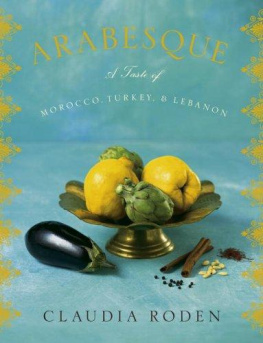
![Claudia Roden - Claudia Rodens Mediterranean: Treasured Recipes from a Lifetime of Travel [A Cookbook]](/uploads/posts/book/289768/thumbs/claudia-roden-claudia-roden-s-mediterranean.jpg)
